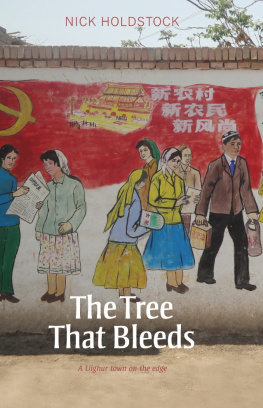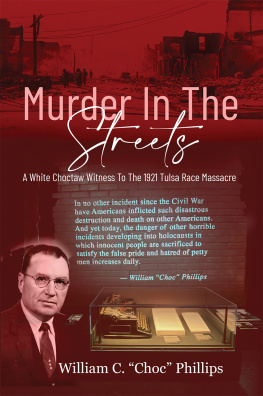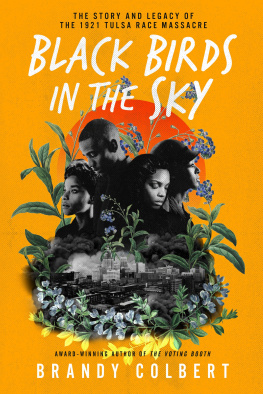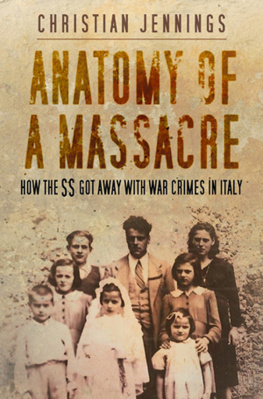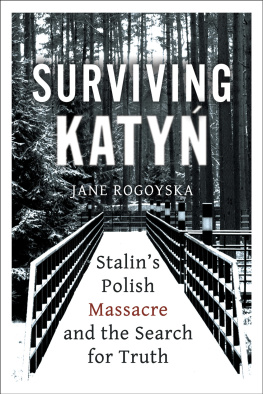Contents
Lord, Rid Poland of the Jews
or, On Polish-Jewish Relations in Jedwabne in the Thirties
I Wanted to Save Her LifeLove Came Later
or, The Story of Rachela Finkelsztejn and Stanisaw Ramotowski
We Suffered Under the Soviets, the Germans, and Peoples Poland
or, The Story of the Three Brothers Laudaski
You Didnt See That Grief in Jews
or, Polish and Jewish Memory of the Soviet Occupation
Ill Tell You Who Did It: My Father
or, The Private Investigation of Jan Skrodzki
If Id Been in Jedwabne Then
or, The Story of Meir Ronen, Exiled to Kazakhstan
A Time Will Come When Even Stones Will Speak
or, The Soliloquies of Leszek Dziedzic
Your Only Chance Was to Pass for a Goy
or, The Survival of Awigdor Kochaw
A Desperate Search for Something Positive
or, The Soliloquies of Krzysztof Godlewski, Ex-Mayor of Jedwabne
Only I Knew There Were Seven of Them
or, The Story of Antonina Wyrzykowska
I, Szmul Wasersztejn, Warn You
or, The Road from Jedwabne to Costa Rica
They Had Vodka, Guns, and Hatred
or, July 7, 1941, in Radziw
The Dreams of Chaja Finkelsztejn
or, The Survival of a Radziw Millers Family
Decent Polish Kids and Hooligans
or, On the Murderers of Jedwabne, Radziw, Wsosz, and the Surrounding Areas
Strictly Speaking, Poles Did It
or, A Conversation with Prosecutor Radosaw Ignatiew
About the Book
On 10 July 1941 a horrifying crime was committed in the small Polish town of Jedwadbne. Early in the afternoon, the towns Jewish population hundreds of men, women and children were ordered out of their homes, and marched into the town square. By the end of the day most would be dead. It was a massacre on a shocking scale, and one that was widely condemned. But only a few people were brought to justice for their part in the atrocity. The truth of what actually happened on that day was to be suppressed for more than sixty years.
Part history, part memoir, part investigation, The Crime and the Silence is an award-winning journalists account of the events of that day: both the story of a massacre told through oral histories of survivors and witnesses, and a portrait of a Polish town coming to terms with its dark past. Including the perspectives of both heroes and perpetrators, Anna Bikont chronicles the sources of the hatred that exploded against Jews and asks what myths grow on hidden memories, what destruction they cause, and what happens to a society that refuses to accept a horrific truth.
Provocative, profoundly moving and ingeniously structured, The Crime and the Silence is a monumental work of non-fiction, and a vital contribution to Holocaust literature.
About the Author
Anna Bikont is a journalist for the Gazeta Wyborcza, Polands main newspaper, which she helped found in 1989. For her articles on the crimes in Jedwabne and nearby Radziw, she was honored with several awards, including the Press Prize for reportage in 2001 and the Polityka Prize for historical writing. In 2011 she received the European Book Prize for the French edition of The Crime and the Silence. In 20082009, Bikont was a fellow at the Cullman Center of the New York Public Library.
About the Translator
Alissa Valles is the author of Orphan Fire and the editor and cotranslator of Zbigniew Herberts Collected Poems: 19561998 and The Collected Prose: 19481998.

Journal
AUGUST 28, 2000
Its a lie that Poles killed the Jews in Jedwabne, says Tadeusz ., a retired doctor from Warsaw and an eyewitness to the events of July 10, 1941.
My boss, Adam Michnik, the editor in chief of the Gazeta Wyborcza, receives this visitor in his office. When Adam informed me that according to Tadeusz ., who was referred to him by a friend, the crime committed in Jedwabne could not be blamed on the Poles, I heard in his voice both excitement and relief. I knew he hadnt been able to come to terms with the facts revealed by Jan Tomasz Gross in Neighbors. Wed talked about it many times. Before Grosss book appeared in May 2000, Id said in a Gazeta editorial meeting that we should report on the little town confronting the crime from its wartime past.
Gross reconstructs events on the basis of three different sources: postwar testimony given by Szmul Wasersztejn, court papers from the postwar trial in which the defendants were charged with collaborating with the occupation forces, and the Jedwabne Book of Memory, recollections of Jewish emigrants from Jedwabne recorded in the United States. He draws tough conclusions and formulates even tougher hypotheses. In Jedwabne, Poles burned all the towns Jews in a barn, a total of sixteen hundred people. It was a collective murder in both senses of the word, writes Gross, in terms of the number of victims and of their persecutors.
Adam rejected all my proposals to go to Jedwabne. Nor did he want to publish excerpts from Grosss book before it was released. Now he wants me to hear for myself what really happened. He has insisted that I be present at this meeting, although Tadeusz . wanted to meet with him alone. Our visitor doesnt allow us to record the conversation or print his surname. Reluctantly he agrees to let me take notes. In 1941 he was fifteen. He happened to be in Jedwabne on July 10. He says he was on his way to the dentist.
In the morning two Germans in black Gestapo uniforms rode into the market square on motorcycles. From a balcony I watched them ordering the Jews to assemble. They put the rabbis black hat on a stick to mock him. I followed the Jews all the way to the barn.
How many Germans did you see at the barn? asked Adam.
Three. Germans like to do things properly, so they had the barn owner brought out to open it with a key, though they could have just lifted the doors out.
And that was all done by three Germans?
There were probably more of them in plainclothes. There were three in uniform, with handguns. I saw the Jews go into the barn of their own accord, as if they were under hypnosis.
And they didnt try to escape when it was on fire?
No, they didnt. Its horrible.
Did any Poles take part in this crime?
No, none.
In every society theres some criminal element. Pick up any newspaper, youll find plenty of reports on rapes, murders. During the occupation there were szmalcowniks, people who blackmailed Jews in hiding.
Only in big cities. You dont know the provinces. Its native-born Poles, the impoverished gentry, who live there. They wouldnt think to take revenge on the Jews for betraying Poles to the Soviets. At the barn they were shouting: Get yourselves out of there, Yids! There were just three Germans standing there with sawed-off shotguns, not even rifles. The older people who were there thought it was wrong. They talked about it at church the week after.
They thought they themselves had been wrong?
No, the Jews. Not one of them had it in him to turn on the Germans.
The Poles thought the victims were in the wrong?
Next page

